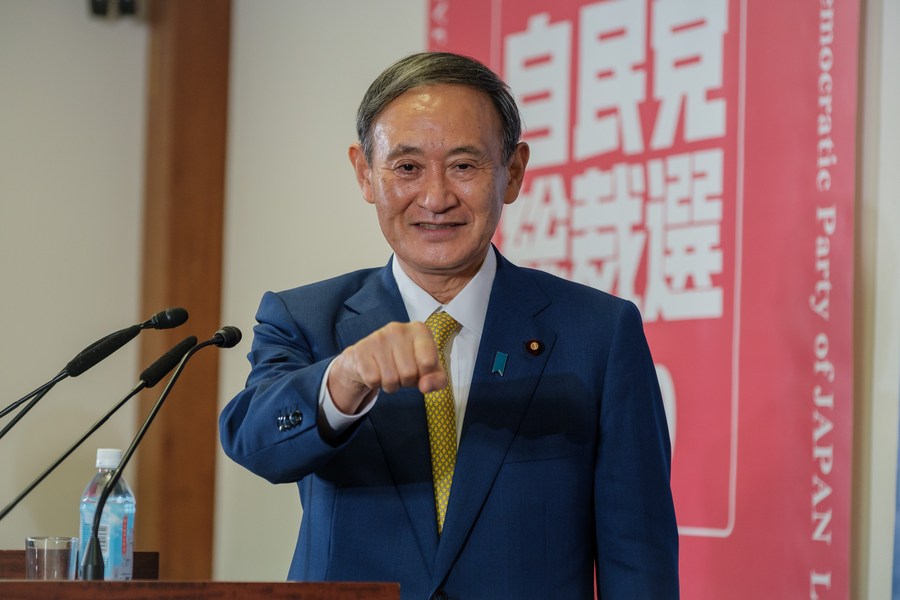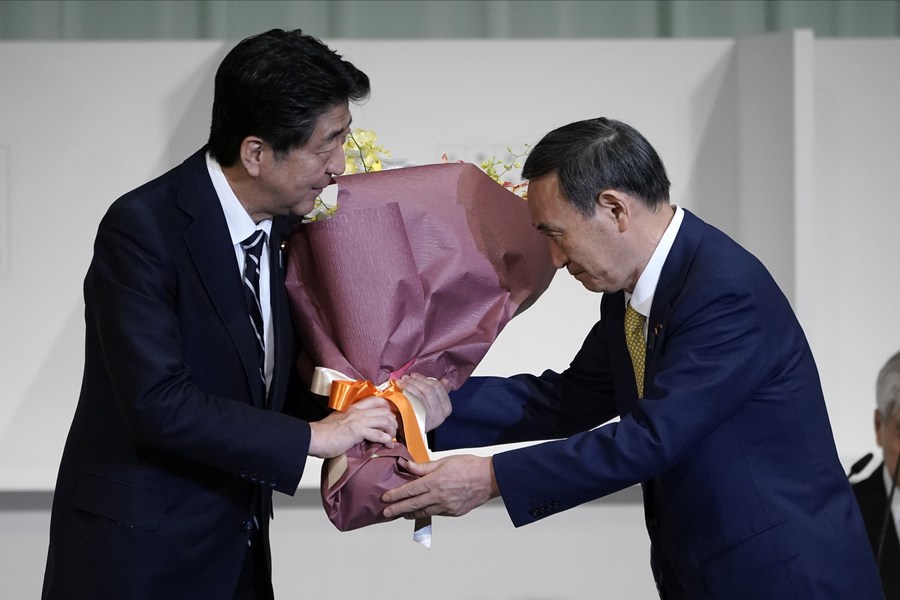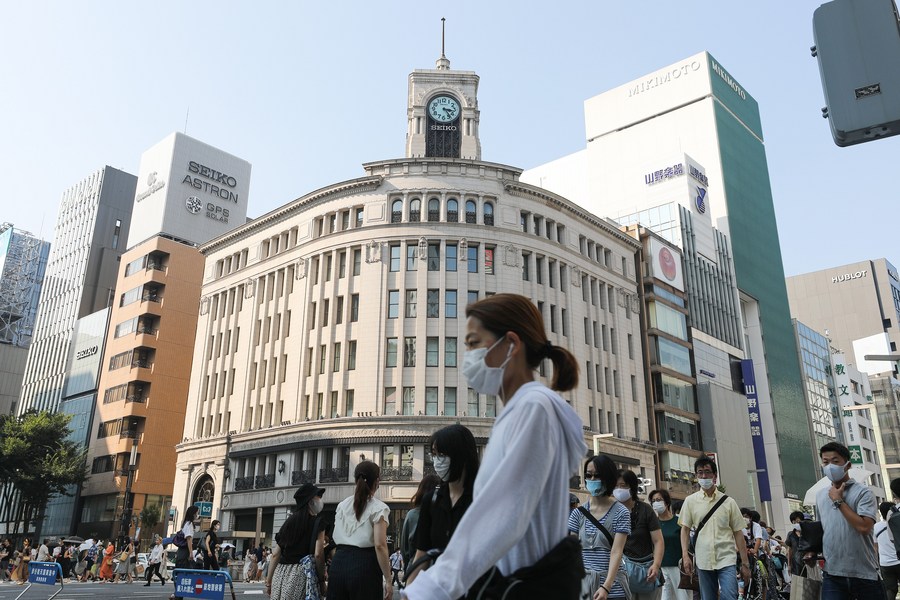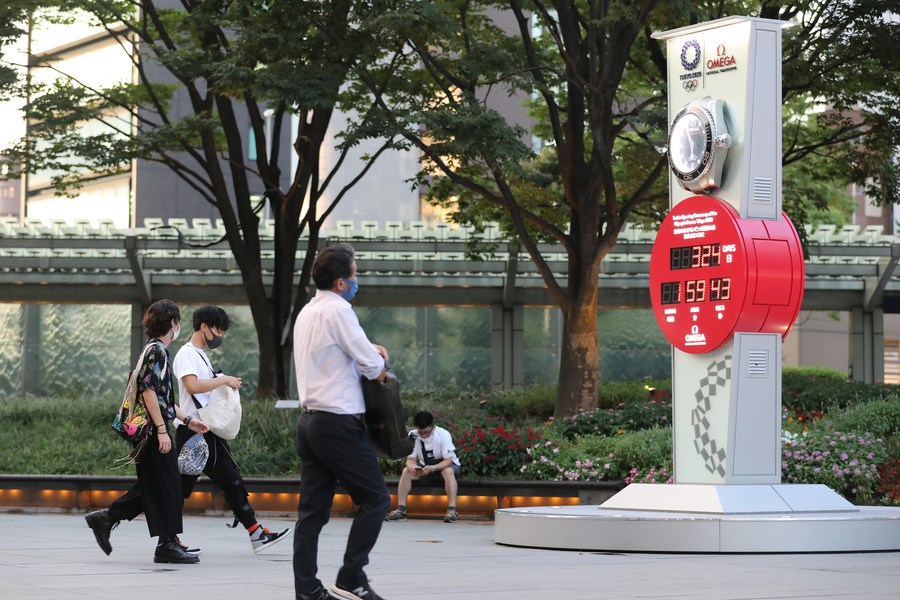
Yoshihide Suga, new president of Japan's ruling Liberal Democratic Party (LDP), gestures before a press conference in Tokyo, Japan on Sept. 14, 2020. (Nicolas Datiche/Pool via Xinhua)
Suga, during the short election race, had pledged to continue Abe's fight against the novel coronavirus pandemic, while promoting economic activities to get the world's third largest, yet heavily recession-hit economy, back on its feet.
TOKYO, Sept. 15 (Xinhua) -- Japan's Chief Cabinet Secretary Yoshihide Suga on Monday was elected as the new president of the ruling Liberal Democratic Party (LDP) to take over from outgoing Prime Minister Shinzo Abe.
Suga, 71, a native of Akita Prefecture, is now virtually assured of becoming the next prime minister owing to the LDP's dominance in both chambers of Japan's bicameral parliament and is expected to be named as the new prime minister at an extraordinary Diet session to be convened on Wednesday.
His victory over his two rivals was something of a formality and showed the overwhelming support he gained from within the ruling party.
At a joint plenary meeting of party members from both houses of the Diet and delegates from local chapters, Suga won 377 votes and was the front-runner from the beginning of the election race as the party's predominantly preferred "continuity candidate."
Former Foreign Minister Fumio Kishida won 89 votes, while former Defense Minister Shigeru Ishiba secured 68 votes.
Suga had, during the short election race, pledged to continue Abe's fight against the novel coronavirus pandemic, while promoting economic activities to get the world's third largest, yet heavily recession-hit economy, back on its feet.
"We must inherit and promote the efforts that Prime Minister Abe has made so that people can overcome the (coronavirus) crisis and live a safe and stable life," Suga told a press conference after winning the election, describing the pandemic as a "national crisis."
He had also consistently underscored his plans to take up the mantle of the outgoing prime minister's "Abenomics" economic policy mix of drastic monetary easing, fiscal stimulus and structural reforms.
His basic policy stances being largely seamless from Abe's were a desirable trait for the powerful LDP factions that supported him in the race.

Japan's Chief Cabinet Secretary Yoshihide Suga (R) presents flowers to Prime Minister Shinzo Abe after Suga was elected as new president of the ruling Liberal Democratic Party (LDP) during the LDP's leadership election in Tokyo, Japan, Sept. 14, 2020. (Eugene Hoshiko/Pool via Xinhua)
"I want to continue 'Abenomics' and enhance it," Suga went on to say, while also expressing his support for keeping Bank of Japan Governor Haruhiko Kuroda's ultra-easy monetary policy in place.
"We cannot have any void in policy," he added. It is my mission to carry forward what has been done under Prime Minister Abe," Suga, who has been one of Abe's closest confidants for nearly eight years, said.
By the time it came to cast ballots, despite not being a member of an LDP faction himself, Suga had garnered the support of five of the LDP's seven major factions and a hefty number of unaffiliated lawmakers to boot.
Such factions included the largest within the LDP led by Hiroyuki Hosoda, a former secretary general, along with another led by LDP Secretary General Toshihiro Nikai.
Deputy Prime Minister Taro Aso, a political heavyweight in the LDP, who serves concurrently as finance minister, also threw the weight of the faction he heads behind the now leader of the LDP.
Suga also scored points with the ruling party for being a familiar face with the public, as the government's former top spokesperson frequently addressed the press and the public in daily briefings, and according to recent media, polls has gained popularity in recent weeks with the electorate.
The presumptive prime minister henceforth will announce a new lineup of the party leadership, including the key roles of LDP secretary-general and the chiefs of the Policy Research Council and General Council.
His Cabinet lineup, which he has stated will comprise "reform-minded" people, will be the first solid cue as to the direction of his new administration, political observers have highlighted.
On this note, Suga said with reference to reforms and deregulation, "I'll create a Cabinet that works for people."
"I want to create a government that people can trust. I will push ahead with deregulation and put an end to ministry sectionalism, endemic vested interests and the practice of blindly following past precedents. I will create a working cabinet," the new LDP chief stated emphatically.

People wearing face masks walk on the street at Ginza in Tokyo, Japan, on Aug. 15, 2020. (Xinhua/Du Xiaoyi)
High on his list of priorities, political pundits have said, will be the need for Suga to hold talks with the LDP's junior coalition partner Komeito to ensure its continued support within the coalition paradigm.
In terms of foreign policy, while not yet a well-known face on the international political scene, Suga has already shut down notions of Asian nations creating their own version of the North Atlantic Treaty Organization to deepen security cooperation, stating that such a move could alienate certain countries Japan is trying to deepen ties with.
While inheriting some of his predecessor's diplomatic challenges, Suga has already highlighted the importance of maintaining stable relations with China, for instance, with Japan's neighbor sending a congratulatory message to Suga on becoming the LDP's president.
"China is willing to work with Suga to continue to deepen cooperation in fighting the new coronavirus pandemic and to promote the continuous improvement and development of relations between Tokyo and Beijing," local media quoted Foreign Ministry spokesman Wang Wenbin as telling reporters in Beijing.
"Suga has pledged to build stable ties with neighboring nations such as China," local media reports also highlighted as being integral to his foreign policy stance.
The upcoming U.S. presidential race and the already postponed Tokyo Olympic and Paralympic Games will also be relatively high on Suga's agenda, once he assumes his role as the nation's leader, political analysts have said.

People wearing face masks walk near by a countdown clock displaying time to go until the start of the postponed Tokyo 2020 Olympic Games in Tokyo, Japan, on Sept. 2, 2020. (Xinhua/Du Xiaoyi)
The whirlwind election was triggered by Abe late last month, and just days after becoming the nation's longest-serving leader in terms of consecutive days in office abruptly announcing that he planned to step down, owing to the same intestinal disease, ulcerative colitis, that forced him to relinquish his role as prime minister during his first stint as leader beginning 2006, flaring up again.
Abe felt he could not fulfill his mandate as prime minister, owing to his ill health and in stepping down has paved the way for his former right-hand man Suga to succeed him as the ruling party's president and the nation's next leader.
Due to Abe stepping down mid-term, the LDP's General Council decided it would be prudent to hold a scaled-down presidential election with voting applicable only to lawmakers and delegates from the party's local chapters, with rank-and-file members excluded form the process.
The abridged election process was decided by the council to simplify the process and to avoid a political vacuum, particularly as the government continues to grapple with dealing with the COVID-19 pandemic.
In the scaled-down vote, 394 Diet members cast ballots and a total of 141 votes were cast by three delegates each from the country's 47 prefectural chapters.
Suga's term as LDP president will be limited to the remainder of Abe's current three-year term through September 2021.
However, speculation has been swirling recently that he may call a general election as early as next month to improve his chances of winning a full three-year term as LDP leader and capitalize on the party's popularity, which tends to improve after a leadership change.
Two of Suga's powerful supporters, Aso and Defense Minister Taro Kono, have both hinted at a snap election being held soon with Aso saying that that the next administration would likely face criticism for being formed without a public mandate.
Kono has made similar remarks, saying that he expects a general election in October.
Suga, however, has said that only when the COVID-19 pandemic has been brought under control would he think about dissolving the more powerful lower house of parliament for a snap election. ■



